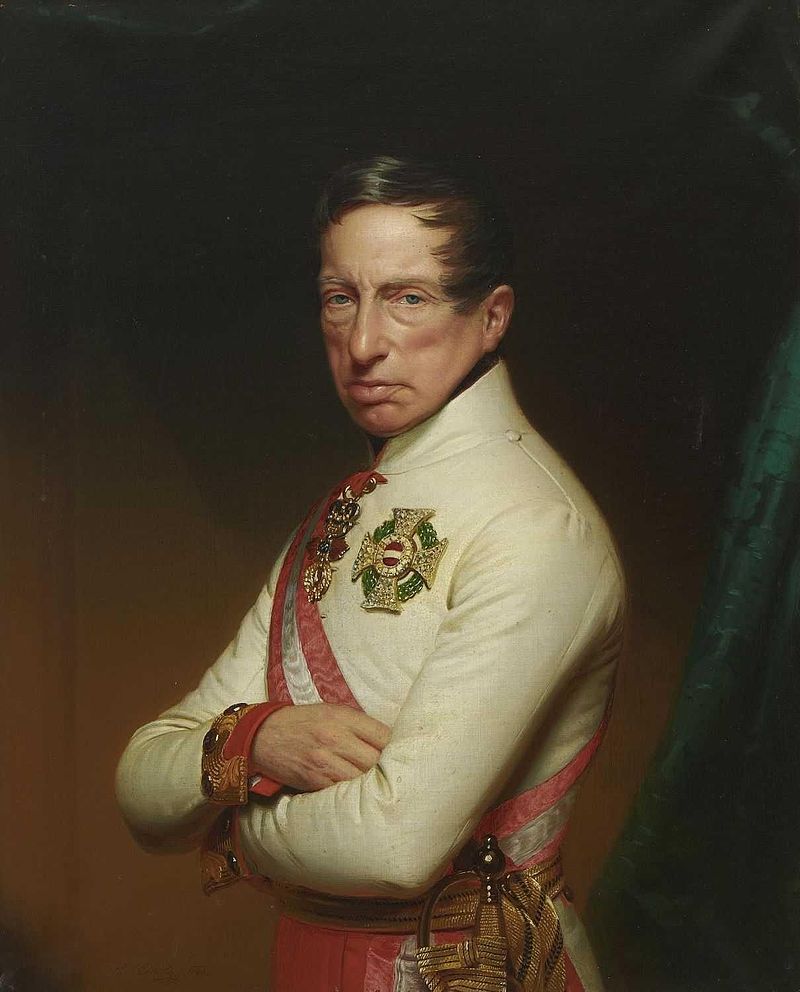Archduke Charles, Duke of Teschen ( 5 September 1771 – 30 April 1847 )
Archduke Charles of Austria, Duke of Teschen (German: Erzherzog Carl Ludwig Johann Joseph Laurentius von Österreich, Herzog von Teschen; 5 September 1771 – 30 April 1847) was an Austrian field-marshal, the third son of Emperor Leopold II and his wife, Maria Luisa of Spain. He was also the younger brother of Francis II, Holy Roman Emperor. Despite being epileptic, Charles achieved respect both as a commander and as a reformer of the Austrian army. He was considered one of Napoleon's most formidable opponents.[1]

He began his career fighting the revolutionary armies of France. Early in the wars of the First Coalition, he saw victory at Neerwinden in 1793, before being defeated at Wattignies 1793 and Fleurus 1794. In 1796, as chief of all Austrian forces on the Rhine, Charles defeated Jean-Baptiste Jourdan at Amberg and Würzburg, and then won a victory at Emmendingen that forced Jean Victor Marie Moreau to withdraw across the Rhine. He also defeated opponents at Zürich, Ostrach, Stockach, and Messkirch in 1799. He reformed Austria's armies to adopt the nation-at-arms principle. In 1809, he entered the War of the Fifth Coalition and inflicted Napoleon's first major setback at Aspern-Essling, before suffering a defeat at the bloody Battle of Wagram. After Wagram, Charles saw no more significant action in the Napoleonic Wars.
As a military strategist, Charles was able to successfully execute complex and risky maneuvers of troops. However, his contemporary Carl von Clausewitz criticize his rigidity and adherence to "geographic" strategy.
Austrians nevertheless remember Charles as a hero of the French Revolutionary and Napoleonic wars

Youth and early career:
Archduke Charles, Duke of Teschen
Charles was born in Florence, Tuscany. His father, then Grand Duke of Tuscany, generously permitted Charles's childless aunt Archduchess Marie Christine of Austria and her husband Albert of Saxe-Teschen to adopt and raise the boy in Vienna. Charles spent his youth in Tuscany, at Vienna and in the Austrian Netherlands, where he began his career of military service in the wars of the French Revolution. He commanded a brigade at the Battle of Jemappes (1792), and in the campaign of 1793 distinguished himself at the Action of Aldenhoven and the Battle of Neerwinden. In this year he became Governor of the Habsburg Netherlands, an office he lost with the occupation of the Low Countries by the French revolutionaries in 1794. The year he became Governor he also received the army rank of Lieutenant Field Marshal. Shortly thereafter another promotion saw him made Feldzeugmeister (equivalent of Lieutenant General). In the remainder of the war in the Low Countries he held high commands, and was present at the Battle of Fleurus (1794).[2]
In 1795 he served on the Rhine, and in the following year, he was entrusted with chief control of all the Austrian forces on that river. His conduct of the operations against Jourdan and Moreau in 1796 marked him out at once as one of the greatest generals in Europe. At first falling back carefully and avoiding a decision, he finally marched away, leaving a mere screen in front of Moreau. Falling upon Jourdan, he beat him in the battles of Amberg (August) and Würzburg (September), and drove him over the Rhine with great loss. He then turned upon Moreau's army, which he defeated and forced out of Germany (Battle of Emmendingen, October).[2
very good
upvote me , comment me ,,,,,, i always back